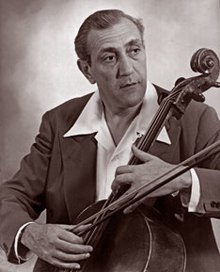In the grand symphony of 20th-century classical music, few voices resonate as deeply and richly as that of Gregor Piatigorsky. Born on April 17, 1903, in Ekaterinoslav (now Dnipro), Ukraine, Piatigorsky’s life reads like a novel – a tale of triumph over adversity, of passion conquering circumstance, and of music as a transformative force.
Picture a young Grisha, as he was known, growing up in a Jewish family plagued by poverty. The Piatigorsky home was so cramped that the boy had to sleep under the piano. Yet it was this very piano that would become his first gateway to music. At age seven, drawn by the siren song of melody, he began to teach himself to play.
But fate had other plans for young Grisha. When a traveling musician left a small cello at their home, Piatigorsky found his true calling. The instrument, nearly as big as he was, became an extension of his soul. Hours melted away as he practiced, his small fingers dancing across the strings, coaxing out sounds that belied his age and experience.
Recognizing his prodigious talent, Piatigorsky’s family scraped together enough money to send him to the Moscow Conservatory. Imagine the wide-eyed boy, barely into his teens, arriving in the bustling capital with nothing but his cello and dreams. Here, under the tutelage of Alfred von Glehn and Anatoliy Brandukov, Piatigorsky’s talent blossomed.
At just 15, Piatigorsky became the principal cellist of the Bolshoi Theater Orchestra. This remarkable achievement, however, coincided with one of the most tumultuous periods in Russian history. The Russian Revolution of 1917 threw the country into chaos, and young Grisha found himself playing in cafes for bread to survive.
Determined to pursue his musical career, Piatigorsky made a daring escape from Soviet Russia in 1921. Picture him, a lanky teenager, sneaking across the Polish border with his cello strapped to his back, dodging bullets and braving the unknown for the sake of his art.
In Berlin, Piatigorsky’s star began to rise. He played with the Berlin Philharmonic and studied with the legendary cellist Hugo Becker. It was here that he began to develop the rich, singing tone and expressive style that would become his trademark.
The 1920s saw Piatigorsky embark on a series of successful tours across Europe and America. His debut recital at Carnegie Hall in 1929 was a triumph, establishing him as one of the premier cellists of his generation. Audiences were captivated not just by his technical mastery, but by the depth of emotion he brought to every performance.
In 1937, fleeing the rising tide of Nazism, Piatigorsky settled in the United States. Here, he found not just a new home but a new chapter in his musical journey. He formed close friendships with other musical giants like Jascha Heifetz and Arthur Rubinstein, with whom he often performed as part of the “Million Dollar Trio.”
Piatigorsky’s influence extended far beyond the concert hall. As a teacher at the Curtis Institute of Music and later at the University of Southern California, he shaped a generation of cellists. His students remember him not just for his musical insights but for his warmth, humor, and zest for life.
A passionate advocate for new music, Piatigorsky commissioned and premiered works by many leading composers of his time, including Stravinsky, Hindemith, and Walton. He also arranged and transcribed numerous pieces for the cello, expanding the instrument’s repertoire.
Beyond music, Piatigorsky was a man of diverse interests. He was an avid art collector, a gifted raconteur, and even tried his hand at writing, publishing a delightful autobiography titled “Cellist” in 1965.
Gregor Piatigorsky passed away on August 6, 1976, in Los Angeles, leaving behind a legacy that continues to inspire musicians and music lovers alike. His life story – from a poor boy in Ukraine to one of the most celebrated cellists of the 20th century – serves as a testament to the power of talent, perseverance, and the transformative nature of music.
Today, when we hear the rich, sonorous tones of a cello, we might just be hearing an echo of Piatigorsky’s influence. His journey reminds us that with passion and dedication, one can indeed rise from rags to riches, creating beauty that enriches the world along the way.


